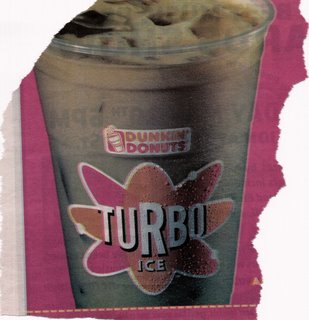Infringement
To: K.L., In-House Counsel
From: TurboGlacier, CEO, Shrink Or Fade
RE: Possible Infringement
Dear Counselor L.,
It was called my attention today that the national pastry purveyor
"Dunkin' Donuts" (DD) appears to be infringing on the intellectual
property of this corporation. To wit, DD is promulgating a new
beverage which they have named the "Turbo Ice", the phrasing and
imagery of which is undeniably similar to our trademarked identity of
"Turbo Glacier".
Please review the enclosed exhibit, and comment by reply as to whether we have a case in this action, and, if so, how many millions I am likely to garner. As usual, you will continue to receive your retainer fee in lieu of any percentage of settlement.
Yours truly,
Turbo Glacier, MD

May 11, 2006
From: TurboGlacier, CEO, Shrink Or Fade
RE: Possible Infringement
Dear Counselor L.,
It was called my attention today that the national pastry purveyor
"Dunkin' Donuts" (DD) appears to be infringing on the intellectual
property of this corporation. To wit, DD is promulgating a new
beverage which they have named the "Turbo Ice", the phrasing and
imagery of which is undeniably similar to our trademarked identity of
"Turbo Glacier".
Please review the enclosed exhibit, and comment by reply as to whether we have a case in this action, and, if so, how many millions I am likely to garner. As usual, you will continue to receive your retainer fee in lieu of any percentage of settlement.
Yours truly,
Turbo Glacier, MD

May 11, 2006

4 Comments:
I doubt you've got a good case, as the products are in to very disparate markets. :D
MEMORANDUM
To: D.R. Turbo, CEO, SoF
From: KL, IHLC
Words, symbols, or phrases may be used as trademarks to identify a particular product. Trademarks make it easier for consumers to quickly identify the source of a product and help to avoid confusion in the marketplace. To determine whether a mark is capable of identifying your good, consider the following four categories: (1) arbitrary or fanciful, (2) suggestive, (3) descriptive, or (4) generic.
First, an "arbitrary or fanciful" mark is a mark that bears no logical relationship to the underlying product. For example, the word "turboglacier" does not suggest an intrinsic relationship to the underlying product, i.e., an entertaining weblog ("blog") intended to regale readers with stories of one good doctor's work and play in the Smallish State. Fanciful marks are inherently distinctive and are given a high degree of protection.
Second, a "suggestive" mark is a mark that evokes or suggests a characteristic of the underlying goods, products, or services. For example "Green Acres" evokes of a facility whose inhabitants worship at the alter of Dorothea Dix, although it does not exactly describe the product or services. Like arbitrary or fanciful marks, suggestive marks are considered distinctive and are given a high degree of protection.
Third, a descriptive mark is a mark that directly describes, rather than suggests, a characteristic or quality of the underlying product. For example, the name "urban mountaineering" might describe some aspect of the underlying product or service. Importantly, a descriptive mark must acquire secondary meaning associated with the specific product before protection may be afforded.
Fourth, a generic mark is a mark that describes the general category to which the underlying product belongs. For example, the term "shrinking" is a generic term for the practice of psychiatry or psychology. Generic marks are entitled to no protection under trademark law.
A trademark can be created by one of two ways: by being the first to use the mark in commerce; or (2) by being the first to register the mark with the U.S. Patent and Trademark Office ("PTO"). 15 U.S.C. § 1127(a) . According to IHLC research, it appears that DD first introduced "Turbo Ice" in July 2005. "Turbo Glacier" first used the mark (in connection with commerce) in August 2004, predating the usage and appearance of "Turbo Ice" by some eleven months.
However, our inquiry does not end here and we turn the discussion to the "likelihood of confusion." If the use of a trademark is likely to cause consumer confusion as to the source of those goods or approval of such goods, it may constitute infringement. The following factors will be considered to determine "consumer confusion," including, but not limited to: (1) the strength of the mark; (2) the proximity of the goods; (3) the similarity of the marks; (4) evidence of actual confusion; (5) the similarity of marketing channels used; (6) the degree of caution exercised by the typical purchaser; (7) the defendant's intent. In general, however using the same or similar term on completely unrelated products will not likely give rise to an infringement claim.
Based upon a consideration of the above, it is the belief of IHLC that no infringement exists. Although we here at SoF very much believe in the strength of the "turbo" brand, we believe the proximity of the good too remote. Additionally, at this stage, we are unsure that actual confusion exists. However, if you would like to further pursue this claim, we would be more than happy to take your money. I refer you to15 U.S.C. §§ 1051, et seq. for further information.
DISCLAIMER: Unless expressly stated otherwise, this message should be construed as or is it intended as legal advice. Besides which I really know nothing about trademark law.
but will it affect the toast brand?
I really hope SofF gets itslef embroiled in a long series of legal issues, just so we can hear more from KL, IHLC.
Post a Comment
<< Home